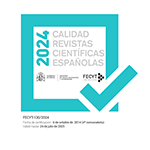El texto y sus fronteras: cuerpo, ritual y poética trágica en el Tiestes de Séneca
Abstract
The human sacrifice and the cannibal banquet constitute the two instances of Atreus’ crime in Seneca’s Thyestes. These instances are based on the perversion of some socio-religious Roman rituals. Atreus’ acts exceed the human limits and enter the monstrous realm of nefas. The imagery of corporeal dismemberment is an essential aspect of the process of ritual perversion. i will explore the textual mechanisms by which this tragedy can be read as a mise en abyme of Seneca’s conception of tragic genre. The bodies mutilated by Atreus during the sacrifice and ‘internalized’ by Thyestes during the banquet weave a metaphor of the intertextual and self-reflexive strategy of the text. i suggest that the diegetical level of Thyestes exhibits some emblematic elements of this unstable and border poetics.Downloads
Article download
License
In order to support the global exchange of knowledge, the journal Cuadernos de Filología Clásica. Estudios latinos is allowing unrestricted access to its content as from its publication in this electronic edition, and as such it is an open-access journal. The originals published in this journal are the property of the Complutense University of Madrid and any reproduction thereof in full or in part must cite the source. All content is distributed under a Creative Commons Attribution 4.0 use and distribution licence (CC BY 4.0). This circumstance must be expressly stated in these terms where necessary. You can view the summary and the complete legal text of the licence.








